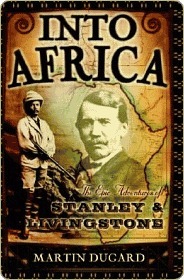Today I'm looking at a history of one of the major news events of the nineteenth century, the hunt for Dr. David Livingstone in central Africa after he had been missing for five years. White explorers going missing was hardly a novel occurrence and Livingstone was not the first, but the stature and fame of Livingstone meant Britain and the larger world knew his name, and the influence of newspapers keeping Africa and Livingstone in the public consciousness ensured a steady interest in the fate of the missionary and explorer. In fact it was a newspaper stunt that eventually found Dr. Livingstone, with reporter Henry Stanley of the New York Herald leading the expedition at the behest of the paper's editor. Stanley's words upon finding Livingstone in the town of Ujiji, ''Dr. Livingstone, I presume.'' have even entered the English lexicon Since I knew basically nothing but the most general details of this period of white men stumbling around and getting themselves lost in swamps in history, I figured this book was worth taking a look.
What precipitated Livingstone's expedition through jungles, swamps, deserts, and savannas was a debate over the source of the White Nile, one of the Nile's main tributaries. (Incidentally just doing a basic Wikipedia search it looks like there's still some debate over what counts as the ''source'' of the Nile) However there were several hypotheses being floated about by people who had actually tramped through Africa. One source that was known for certain was Lake Victoria, a large lake that sprawls across the modern countries of Uganda, Kenya, and Tanzania and which the White Nile definitively drains from. What was (and is) debated is if there was a source further south beyond Lake Victoria. Some hypothesized that a river or series of lakes and rivers connected Lake Tanganyika, further to the south, with Lake Victoria. Livingstone himself believed that lakes further south, such as Lake Malawi, might even be connected to Lake Tanganyika and Lake Victoria. Because of his status and reputation as an explorer, Livingstone set out on an expedition into Central Africa.
The thrill for the people back home was that central Africa was one of the last unknown places to Europeans. Nevermind that other people had been living there quite happily for thousands of years and had even traded with places as far away as China, to Europe it was terra incognita. So there was a great amount of romance of the brave, solitary explorer delving into the unknown, and Livingstone actually had a habit of going on these expeditions only with native porters and assistants. And this was not uncommon. Many expeditions of the time consisted of only a handful of white Europeans and a large train of African, Arab, or Indian porters, soldiers, and assistants. And if the Europeans should die, the hired help had little or no motivation to bring word back to European outposts in locations like Zanzibar. In fact in some cases, the porters and assistants were accused of murdering their employers, which made it even less palatable to report back to authorities. So once Livingstone disappeared into Africa, neither he nor word came back it was very unlikely anyone would hear from him again.
Stanley's was not the first expedition to go in search of Livingstone, but it was the only one to actually find him. A previous expedition had gone to confirm rumors of his death, but after finding convincing proof Livingstone was alive it returned to England. In many ways it was sheer good fortune that Stanley, an absolute neophyte when it came to traveling in Africa, actually met Livingstone at Ujiji. Both Livingstone and Stanley had been extremely ill during their expeditions, suffering from malnutrition, dehydration, and a variety of disease like malaria endemic to the tropics. Either one could have died before reaching the other. Livingstone could have failed to make it to Ujiji, where he hoped relief supplies was waiting for him. Stanley could have arrived before Livingstone, and spent all his dwindling supplies waiting or searching for Livingstone before having to return to the coast. It truly was a tremendous coincidence of good fortune for both men.
Overall I thought this book was interesting, although there's a certain level of crazy to these explorers who decide to go wandering through jungles and suffer all manner of diseases. I certainly would have headed back home at the first opportunity. Or never left home in the first place. I do suspect Dugard stretches or sensationalizes some facts, but I don't see any serious flaws with his methodology, especially considering the copious written material available for Dugard to draw upon for research. It is heavily from the European perspective, but that's hardly surprising. Dugard also tries to put things within the larger context of the nineteenth century, but it's mostly focused on the historical figures than the larger picture. If you're specifically interested in the life and work of Livingstone and Stanley, I think this book is a good opportunity.
- Kalpar


No comments:
Post a Comment